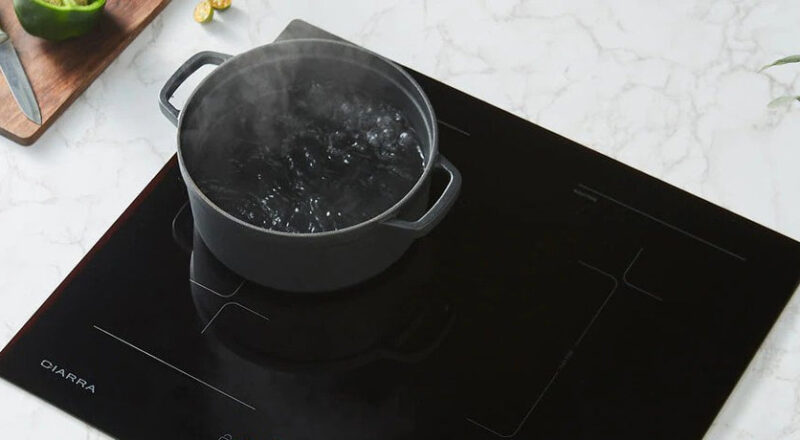Cooking enthusiasts often find themselves at a crossroads when it comes to choosing between cast iron and stainless steel for their induction cooktops. Both materials have their unique strengths and potential drawbacks, and understanding these can significantly impact your culinary experiences. This guide will delve into the nuances of using cast iron vs stainless steel on induction, helping you make an informed decision.

Understanding Induction Cooking
Before diving into the specifics of cast iron and stainless steel, it’s crucial to understand how induction cooking works. Induction cooktops use electromagnetic fields to heat pots and pans directly. This method is not only efficient but also provides precise temperature control, making it a favorite among professional chefs and home cooks alike.
How Induction Works
Unlike traditional gas or electric stoves, induction cooktops remain cool to the touch. They heat the cookware through magnetic induction, requiring pots and pans to have a magnetic base. This efficiency makes induction cooking both faster and safer.
Cast Iron: A Timeless Classic
Cast iron cookware has been a kitchen staple for centuries, known for its durability and excellent heat retention. Let’s explore why it remains a popular choice for induction cooktops.
Advantages of Cast Iron
Cast iron is renowned for its ability to retain and distribute heat evenly, which is ideal for slow cooking and frying. Its durability is unmatched, often lasting generations if properly maintained. Additionally, cast iron can be used on various heat sources, including ovens and open fires.
Considerations When Using Cast Iron
While cast iron is incredibly versatile, it does require regular seasoning to maintain its non-stick surface and prevent rusting. Moreover, it is quite heavy, which can be a drawback for some users.
Stainless Steel: The Modern Marvel
Stainless steel cookware is a modern kitchen favorite, known for its sleek appearance and ease of use. Here’s why it might be the right choice for your induction cooktop.
Advantages of Stainless Steel
Stainless steel is prized for its non-reactive nature, meaning it won’t alter the taste of acidic foods. It is also easier to maintain than cast iron, as it doesn’t require seasoning and is often dishwasher safe. Its lightweight nature makes it easy to handle and store.
Considerations When Using Stainless Steel
While stainless steel is convenient, it doesn’t retain heat as well as cast iron. This can lead to hot spots if not used with a thick base. Additionally, high-quality stainless steel cookware can be expensive, though it’s often a worthwhile investment.
Comparing Cast Iron and Stainless Steel on Induction
When it comes to induction cooktops, both cast iron and stainless steel have their place. Here’s a detailed comparison to help you decide.
Heat Conductivity and Retention
Cast iron excels in heat retention, making it perfect for dishes that require long cooking times. Stainless steel, however, heats up faster but cools down quickly, suitable for quick-cooking meals.
Maintenance and Care
Maintenance varies significantly between the two. Cast iron requires regular seasoning and careful cleaning, while stainless steel is generally low maintenance and easier to clean.
Cost Considerations
Cost can be a deciding factor. Cast iron is typically more affordable, though high-end brands can be pricey. Stainless steel sets, especially those with a copper or aluminum core, can be more expensive.
Choosing the Right Cookware for You
Your choice between cast iron and stainless steel should align with your cooking style and needs. Consider what you cook most often and the level of maintenance you’re willing to commit to.
For the Traditional Cook
If you enjoy slow-cooked meals and are willing to invest time in maintaining your cookware, cast iron might be your perfect match.
For the Modern Chef
If convenience and ease of use are your priorities, and you favor quick meals, stainless steel could be the better choice.
Conclusion
Both cast iron and stainless steel offer unique advantages for induction cooking. By understanding their differences and considering your cooking habits, you can make a choice that enhances your culinary creations and complements your kitchen.

FAQ
Is cast iron compatible with all induction cooktops?
Yes, as long as the base is flat and smooth, cast iron works well on induction cooktops.
Can stainless steel damage an induction cooktop?
No, stainless steel is safe to use on induction cooktops. Ensure it has a magnetic base for compatibility.
Which is more durable: cast iron or stainless steel?
Both are durable, but cast iron can last longer with proper care, while stainless steel is more resistant to rust and damage.
This article contains affiliate links. We may earn a commission at no extra cost to you.

